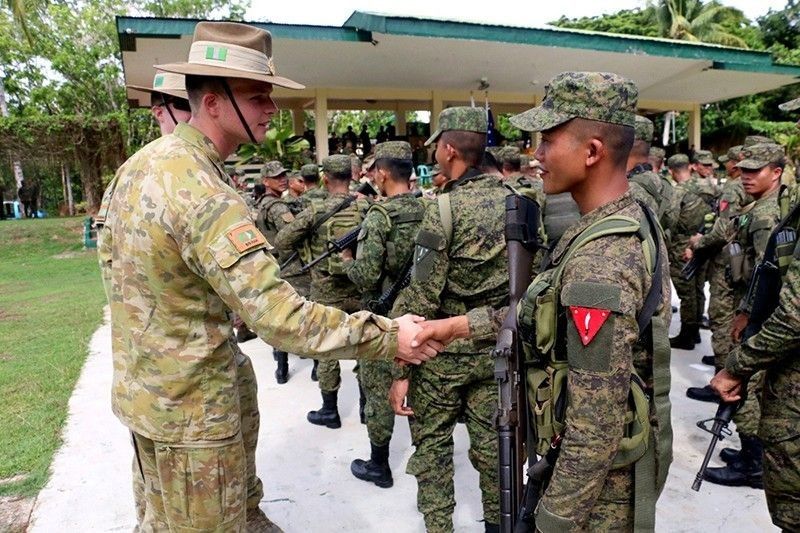A better VFA? A look at the Status of Visiting Forces Agreement with Australia

MANILA, Philippines
President Rodrigo Duterte said he will
The US VFA
In urging concurrence with its ratification in 2012, Loren Legarda — then chair of the Senate Comittee on Foreign Relations — touted the agreement as a "benchmark for future bilateral or multilateral arrangements of a similar nature."
Among the thorny issues that Legarda said the agreement addresses is jurisdiction over visiting troops, saying the "SOVFA was crafted in a manner that ensures respect for and ascendance of laws of the Receiving State" and provides a "clear set of rules" in case of "concurrent jurisdiction, or where an offense is punishable under the laws of both the Receiving and Sending States."
She added that the agreement creates a joint committee of civilian official with the duty to resolve jurisdictional issues. Jurisdictional issues may also be submitted to local judicial authorities for resolution.
"This is a provision which clearly addresses concerns borne out of previous experiences," Legarda said without mentioning names.
Respect for law
Both VFAs acknowledge respect for the laws of the receiving state—often the Philippines, although Filipino military personnel have also been sent to Australia for training and further studies—and to abstain from any activity inconsistent with the agreement as well as from any political activity in the country.
Size of visiting force
Only the Australia VFA has an article
Article 4 of the Australia VFA reads:
For this purpose, the Sending State shall notify the Receiving State thirty (30) days prior to entry, or as otherwise mutually determined of the size or number of the Visiting Force and its Civilian Component, including, as far as practicable, the names of the members of the Visiting Force and its Civilian Component.
Entry and departure
The Philippine government shall facilitate the admission of American and Australian personnel and their departure under both agreements.
Both Australian and American troops are exempt from any requirement to apply for a visa for entry or departure into the country.
While they are exempt from visa requirements,
Members of the Australian civilian component, meanwhile,
Driving licenses and vehicle registration
Both VFAs
The US VFA is more specific that vehicles owned by its government need not be registered but shall have
Criminal jurisdiction
Provisions on criminal jurisdiction in both VFAs
Section 2(a), Article V of the US VFA reads:
Philippine authorities exercise exclusive jurisdiction over the United States personnel
with respect to offenses, including offenses relating to the security of the Philippines, punishable under the laws of the Philippines, but not under the laws of the United States.
This is like Section 2(b) of the Australia VFA:
The Authorities or Service Authorities if the Sending State
shall have the right to exercise exclusive jurisdiction over persons subject to the Service Law of the Sending State,with respect to offences punishable by the laws of the Sending State but not by the laws of the Receiving State.
The two VFAs differ
Both the US and Australia have primary rights to exercise jurisdiction over members of the visiting force in the Philippines in relation to offenses against the property or security of the sending state and offenses arising out of any act or omission done in performance of duty.
Section 4(d), Article V of the US VFA also
Recognizing the responsibility of the United States military authorities to maintain good order and discipline among their forces, Philippine authorities will, upon request by the United States, waive their primary right to exercise jurisdiction except in cases of particular importance to the Philippines.
This is similar with the provisions on the Australia VFA but the latter is more specific, stating that authorities with the primary right to exercise jurisdiction "shall give sympathetic consideration to a request for
Both the Australia and the US agreements have provisions
Despite the provisions, Daniel Smith, a US Marine convicted for rape in 2005, was taken out of Makati City Jail and brought to a detention facility of the US government under the Romulo-Kenney Agreement signed in December 2006.
The agreement held that "Lance Corporal Daniel J. Smith, United States Marine Corps, be returned to U.S. military custody at the U.S. Embassy in Manila."
Smith was later acquitted on appeal.
RELATED: Beyond Bato's US visa: A look at issues previously raised against VFA
Movement of vessels and aircraft
US armed forces' vehicles, vessels and aircraft are free from the payment of landing or port fees, navigation or overflight charges,
The Australia VFA has more provisions on vessels and aircraft, such as being allowed, with consent from Philippine authorities, to transport explosives, including ammunition within the country's territory.
Australian vessels may also visit ports of the Philippines for
Environmental protection
Only the Australian agreement has its own
"The Parties commit themselves to prevent the dumping of wastes and other matter that create hazards to human health, harm living resources and marine life, damage amenities or interfere with the legitimate uses of natural resources within the territorial jurisdiction of the Receiving State," the agreement read.
"The SOVFA with Australia sets a precedent in defense agreements in that it has unique provisions on environmental protection," Legarda said in her sponsorship speech in 2012.
"The Agreement explicitly prohibits the conduct of exercises or other activities in protected areas, ancestral domain areas, critical watersheds and protected forest areas. It also provides that any environmental damage will be subject to claims and compensation and that the Sending State will be responsible for the rehabilitation of damaged areas," she also said.
- Latest
- Trending
































